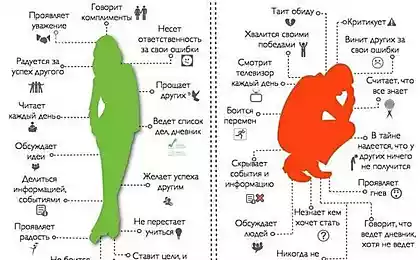147
Six of the most terrible methods of brainwashing
The world is full of various self-help gurus and seminars that promise to turn our lives into fairy tales with the help of well-chosen words, strained optimism, insincere smiles or other nonsense. It's like the words we say are some form of magic.

But here's the thing. Our brain is a kluj, an extremely imperfect information processing machine. Therefore, cheating it when using certain techniques is very simple. That's what scammers use. Official science has just begun to study this area of life, and this is what it has found.
6. If you repeat some nonsense regularly, people will start to believe it.
All political talk shows are built on this method: they are easy to watch, they attract large audiences because of the politicians present there, who, in turn, are happy to earn another political points and infect people with their idea. People believe in fables because they are told in the media as true facts. For the same reason, opponents of vaccination continue to refuse it, although it is proven that without it, some diseases spread at the rate of wildfire.
This works because if our brain often hears some thoughts and ideas, it begins to consider them as beliefs accepted in its group. Studies have shown that if at least one person publicly repeats a thesis three times, they have a 90 percent chance of forming people around them who hold the same views.
Researchers from the University of Michigan have discovered that there is such a phenomenon as memory distortion. This is a glitch of the brain, which every time you remember something from the past draws new touches to the “remembering”. As a result, over the years, some things from the past seem to us quite different from what they actually were. Politicians also use this skillfully.
5. Audience imitation still works
If you work in a profession where giving advice brings the lion’s share of income, you probably know that in order to win over the audience, you need to pretend to be part of it. Getting people to do terrible things is pretty easy if you pretend to be part of a group of people, or better yet, a leader.
Research after research proves that people tend to be more supportive of those they consider their own. Customers are more likely to buy goods and services from those sellers who are most similar to them – gestures, social status, manner of behavior.
One Dutch study even found that mimicry helped waiters collect more tips. Those customers who were imitated left an average of 68% more tips.
4. For people to do something, they need to be taught that it is their own decision.
From the fact that the visitor of the courses on weight loss and proper nutrition believes that the diet is his own decision, and not, for example, the decision of relatives, depends on the success of the course. In order to resist temptation, people need to believe that they made the decision.
Propaganda works in the same way: it does not call for active action, but only organizes facts and conjectures in the right way so that the consumer comes to the necessary conclusions himself. Then he will selflessly believe in his own conclusions for a very long time.
3. The ceremony adds meaning to the action
Man is a creature that is extremely dependent on rituals. It is proved that people who are on holidays and feasts, the food seems tastier than usual. For exactly the same reason, food in restaurants served by a waiter in a tuxedo seems tastier than food cooked at home by his wife, although in fact this may not be the case.
This is why psychics perform a bizarre ritual before reproducing any insignificant facts. And charlatans at self-development seminars make us play stupid social games. Why does it work? Exactly for the same reason: when we perform our rituals, we feel more involved in the life of our group.
2. The phrase “I’m excited” reduces stress and increases trust.
People who show vulnerability always have higher levels of empathy. That is why experienced professors, speaking in the department, always apologize for being excited.
It’s also been proven that repeating the fact that you’re excited can reduce your stress hormone production. And help calm down. So if you want to be fooled, they admit to worrying not only because they want to get in the position, but also because they subconsciously reduce their own level of anxiety.
1. Justifying the cause increases the chances of persuasion.
Imagine you’re standing in line at McDonald’s. You get a guy down on your shoulder who politely asks, "Do you mind if I stand in front of you?" After a week, a similar-looking guy will fall back on his shoulder and say, “Do you mind if I stand in front of you, I need to get my coffee?” In which case will you refuse, and in which will you respond positively to the request? Most people think they will take both requests equally negatively.
The difference between the two scenarios is enormous. 93% of people who were tested for the second scenario agreed to the request of the impudent. In the first case, it almost never worked. Simply justifying a cause in an unexpected way works wonders.
Why? When a person explains why he needs to get to the checkout faster, he is automatically temporarily elevated in social status and perceived as more busy and important to society than those to whom he shows indulgence. When you stand in line, you are often immersed in your thoughts, resulting in the effect of surprise. This is a kind of stress to which the brain reacts criminally banal: claims its place next to weak people, and gives way to stronger ones.
source:lifter.com.ua
Source: /users/1077

But here's the thing. Our brain is a kluj, an extremely imperfect information processing machine. Therefore, cheating it when using certain techniques is very simple. That's what scammers use. Official science has just begun to study this area of life, and this is what it has found.
6. If you repeat some nonsense regularly, people will start to believe it.
All political talk shows are built on this method: they are easy to watch, they attract large audiences because of the politicians present there, who, in turn, are happy to earn another political points and infect people with their idea. People believe in fables because they are told in the media as true facts. For the same reason, opponents of vaccination continue to refuse it, although it is proven that without it, some diseases spread at the rate of wildfire.
This works because if our brain often hears some thoughts and ideas, it begins to consider them as beliefs accepted in its group. Studies have shown that if at least one person publicly repeats a thesis three times, they have a 90 percent chance of forming people around them who hold the same views.
Researchers from the University of Michigan have discovered that there is such a phenomenon as memory distortion. This is a glitch of the brain, which every time you remember something from the past draws new touches to the “remembering”. As a result, over the years, some things from the past seem to us quite different from what they actually were. Politicians also use this skillfully.
5. Audience imitation still works
If you work in a profession where giving advice brings the lion’s share of income, you probably know that in order to win over the audience, you need to pretend to be part of it. Getting people to do terrible things is pretty easy if you pretend to be part of a group of people, or better yet, a leader.
Research after research proves that people tend to be more supportive of those they consider their own. Customers are more likely to buy goods and services from those sellers who are most similar to them – gestures, social status, manner of behavior.
One Dutch study even found that mimicry helped waiters collect more tips. Those customers who were imitated left an average of 68% more tips.
4. For people to do something, they need to be taught that it is their own decision.
From the fact that the visitor of the courses on weight loss and proper nutrition believes that the diet is his own decision, and not, for example, the decision of relatives, depends on the success of the course. In order to resist temptation, people need to believe that they made the decision.
Propaganda works in the same way: it does not call for active action, but only organizes facts and conjectures in the right way so that the consumer comes to the necessary conclusions himself. Then he will selflessly believe in his own conclusions for a very long time.
3. The ceremony adds meaning to the action
Man is a creature that is extremely dependent on rituals. It is proved that people who are on holidays and feasts, the food seems tastier than usual. For exactly the same reason, food in restaurants served by a waiter in a tuxedo seems tastier than food cooked at home by his wife, although in fact this may not be the case.
This is why psychics perform a bizarre ritual before reproducing any insignificant facts. And charlatans at self-development seminars make us play stupid social games. Why does it work? Exactly for the same reason: when we perform our rituals, we feel more involved in the life of our group.
2. The phrase “I’m excited” reduces stress and increases trust.
People who show vulnerability always have higher levels of empathy. That is why experienced professors, speaking in the department, always apologize for being excited.
It’s also been proven that repeating the fact that you’re excited can reduce your stress hormone production. And help calm down. So if you want to be fooled, they admit to worrying not only because they want to get in the position, but also because they subconsciously reduce their own level of anxiety.
1. Justifying the cause increases the chances of persuasion.
Imagine you’re standing in line at McDonald’s. You get a guy down on your shoulder who politely asks, "Do you mind if I stand in front of you?" After a week, a similar-looking guy will fall back on his shoulder and say, “Do you mind if I stand in front of you, I need to get my coffee?” In which case will you refuse, and in which will you respond positively to the request? Most people think they will take both requests equally negatively.
The difference between the two scenarios is enormous. 93% of people who were tested for the second scenario agreed to the request of the impudent. In the first case, it almost never worked. Simply justifying a cause in an unexpected way works wonders.
Why? When a person explains why he needs to get to the checkout faster, he is automatically temporarily elevated in social status and perceived as more busy and important to society than those to whom he shows indulgence. When you stand in line, you are often immersed in your thoughts, resulting in the effect of surprise. This is a kind of stress to which the brain reacts criminally banal: claims its place next to weak people, and gives way to stronger ones.
source:lifter.com.ua
Source: /users/1077























